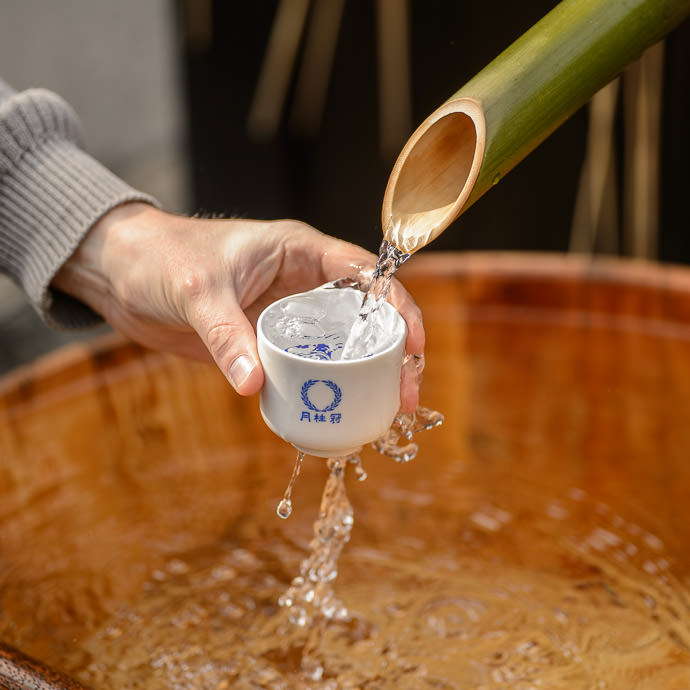
Nikon D4 + Voigtländer 125mm f/2.5 — 1/640 sec, f/2.5, ISO 180 — map & image data — nearby photos
“All You Can Drink” Sake Flows Like Water
in my dreams
(however, water does flow like water at the Gekkeikan Sake Museum in Kyoto Japan)
I recently made my first trip to the area of southern Kyoto historically known for its sake production, which likely dates back thousands years. Written on the cup above is “月桂冠” (Gekkeikan), the name of a sake-brewing company founded in 1639.
Gekkeikan sake is ubiquitous in Japan. Here you see its name on barrels outside a temple in the area...
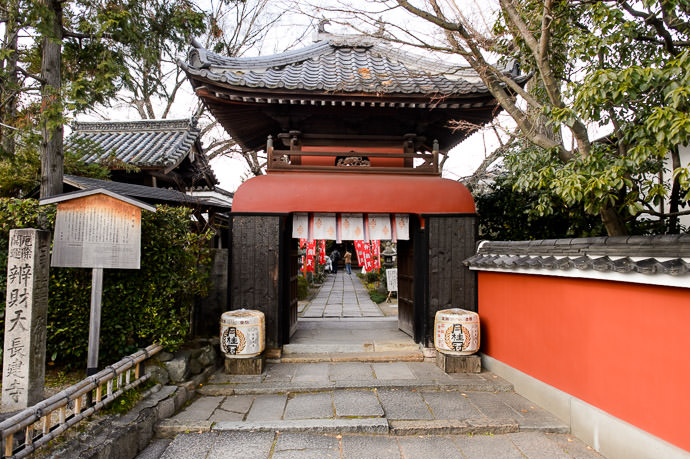
Nikon D4 + Nikkor 24mm f/1.4 — 1/640 sec, f/4.5, ISO 900 — map & image data — nearby photos
Entrance to the Chokenji Temple (長建寺)
“Long Health Temple” supported by sake
It's my understanding that the (certainly-empty) barrels of sake represent a monetary donation from the brewery, to match what in olden times was an actual gift of sake. In either case, the brewery gets advertisement and good karma.
This particular temple is quite small, with a chunk of its area given to a courtyard with a couple of fenced-in features..
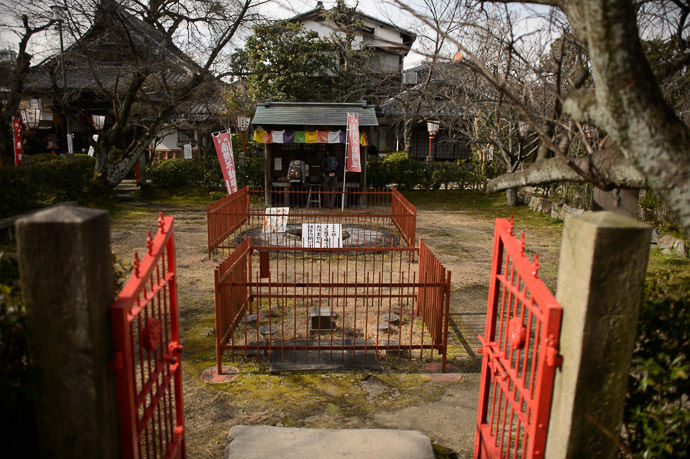
Nikon D4 + Nikkor 24mm f/1.4 — 1/1000 sec, f/1.8, ISO 100 — map & image data — nearby photos
Temple's Courtyard
The courtyard's main attraction is this fire pit with two big, ugly signs:
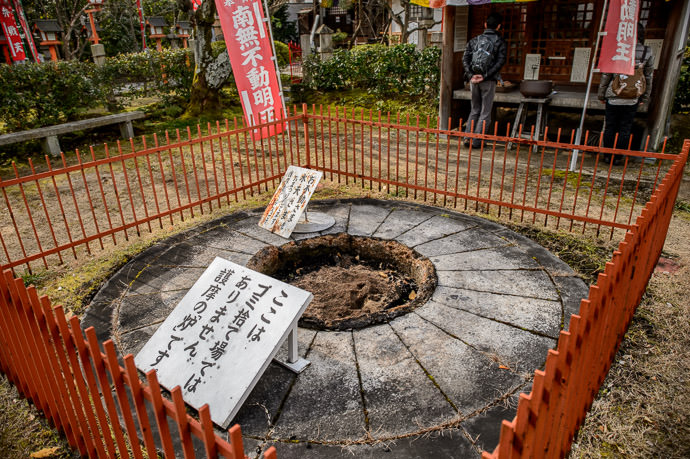
Nikon D4 + Nikkor 24mm f/1.4 — 1/640 sec, f/3.5, ISO 800 — map & image data — nearby photos
Inexplicable
What struck me about this scene was the huge sign in the foreground, which reads "This is not a place to throw garbage. It's a fire pit for ceremonial burning of ceder sticks.", referring to a Buddhist ceremony likely comparable to the Shinto ceremonies shown here and here. My first thought was that such a sign was silly because even a child could instinctively know that the fenced-off area surrounded by precisely-carved stone was not a place to throw your trash. Yet, here was the big sign, so I was left wondering what transpired to cause the owner to feel the need for such a sign. I suppose it's a sad reflection on the state of humanity, even worse than the no-tripods-in-your-possession temple. Sigh.
Anyway, we continued the short distance to an old Gekkeikan factory building now used as a museum...
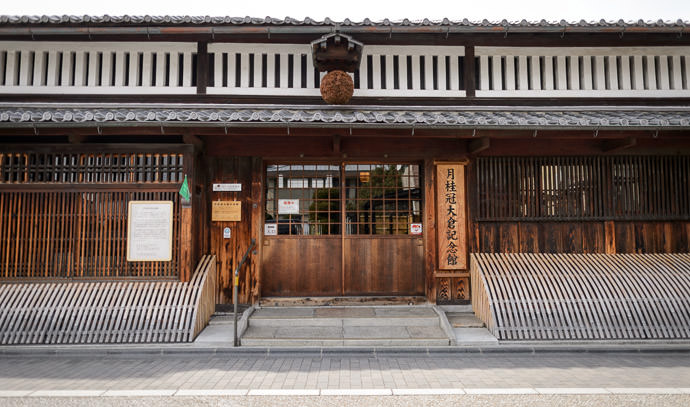
Nikon D4 + Nikkor 24mm f/1.4 — 1/1000 sec, f/1.4, ISO 100 — map & image data — nearby photos
Gekkeikan Okura Memorial Museum
月桂冠大倉記念館
They had water running into a basin, with a sign saying that it was from a deep well that provides water for the sake production. I should have tried the water. Instead, I took pictures of it.
Kyoto friend Alain, who had invited me, spent considerable time composing a photo of the basin from above...
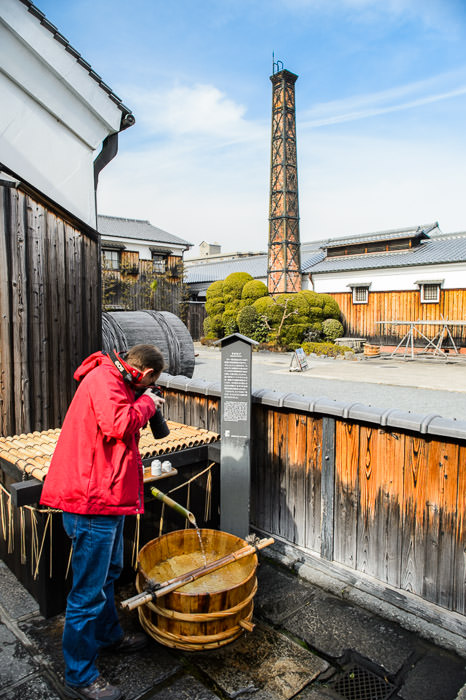
Nikon D4 + Nikkor 24mm f/1.4 — 1/640 sec, f/3.5, ISO 320 — map & image data — nearby photos
Alain and his Basin
Showing no shame, I totally copycatted him and made my own attempt at his shot. I've since seen his result and it's far superior to mine (because, er, he has a better camera? 😉), but FWIW here's mine:
Next to the museum were three huge barrels, the largest of which measuring about six feet across:
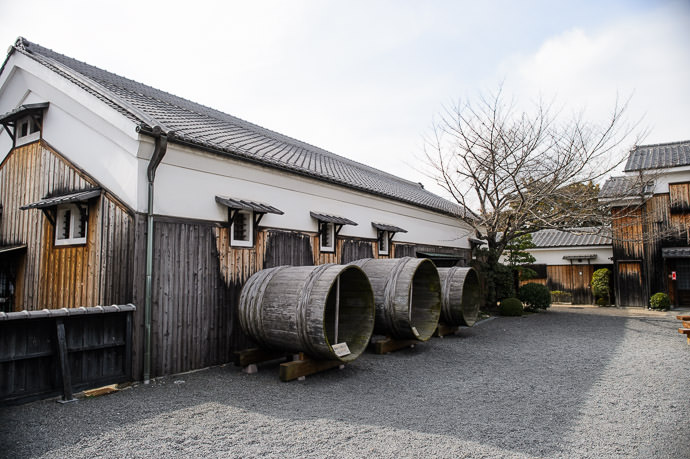
Nikon D4 + Nikkor 24mm f/1.4 — 1/640 sec, f/3.5, ISO 180 — map & image data — nearby photos
Big Barrels
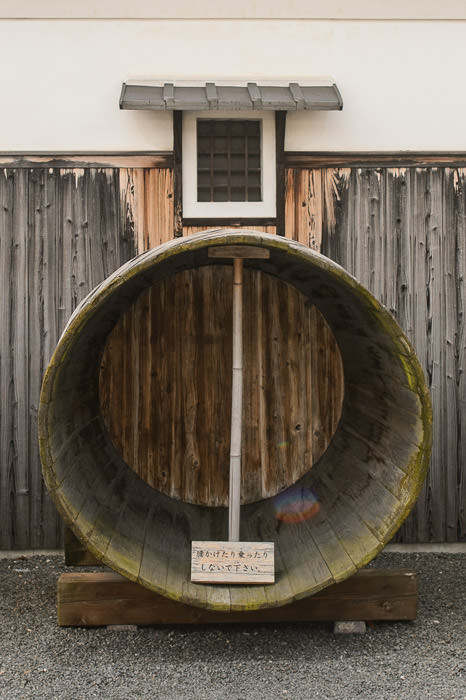
Nikon D4 + Nikkor 24mm f/1.4 — 1/640 sec, f/3.5, ISO 400 — map & image data — nearby photos
Silly Sign #2
“Don't hang on or climb on”
(but, oddly, no mention about going inside)
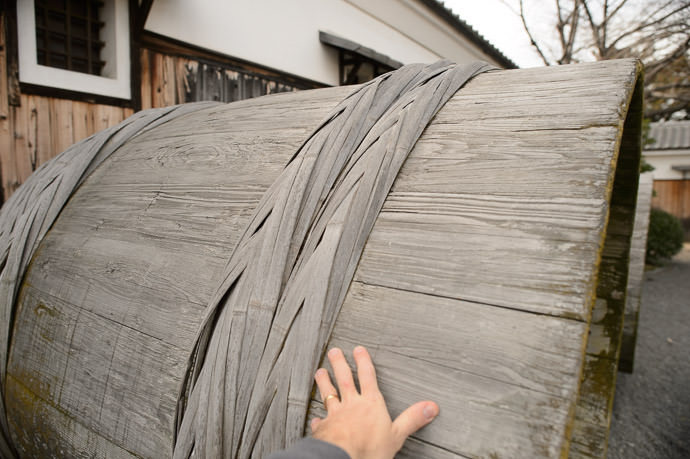
Nikon D4 + Nikkor 24mm f/1.4 — 1/640 sec, f/3.5, ISO 450 — map & image data — nearby photos
Hand for Scale
Long bamboo strips were woven around the barrel in what appeared to be rings to keep the wooden slats together. I wonder whether it's cosmetic, or whether it could actually hold the slats tightly enough to form a watertight seal(?) It seems improbable, but perhaps they're installed while in some kind of expanded state (e.g. after boiling?) and so constrict as they dry?
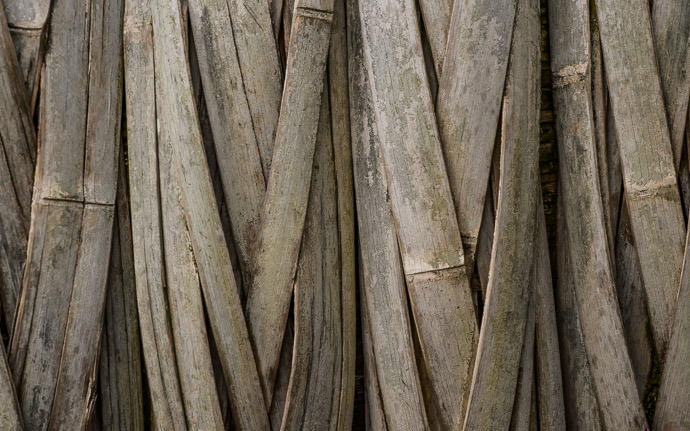
Nikon D4 + Voigtländer 125mm f/2.5 — 1/640 sec, f/8, ISO 2000 — map & image data — nearby photos
Ties that Bind
This is, of course, the answer to the other day's A Woven(ish) “What am I?” Quiz. I'd given the hint that the location name in the image metadata might lead one to an answer, but for the record even with that hint I myself would never have figured it out because I'd never seen the “bamboo binding” thing before.
Inside the small museum (which I'll cover in a separate post) you can see a lot of history about how sake was made in former days. It was nice to see this long-history view of Gekkeikan because in my experience it's always been the ubiquitous cheap sake in convenience stores and restaurants, which has given me the feeling that it's what someone stocks when they don't want to think about quality and just need to mark “sake” off the checklist.
Once you emerge from the display rooms, you're greeted with what was certainly my favorite sign for the day:
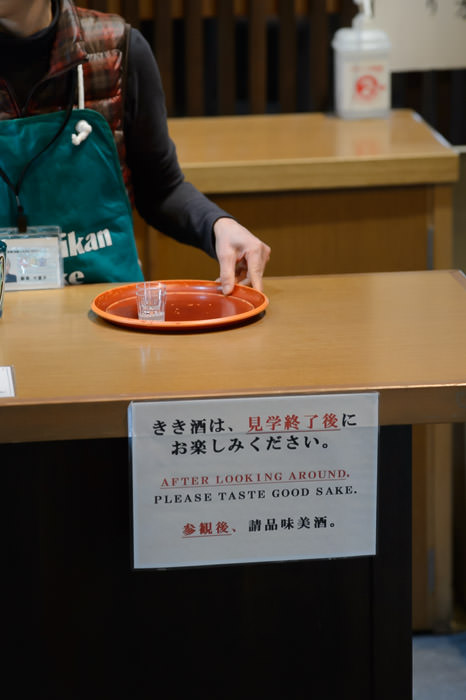
Nikon D4 + Voigtländer 125mm f/2.5 — 1/160 sec, f/4, ISO 6400 — map & image data — nearby photos
Well Okay, I Don't Mind if I Do!
I love that Japanese has a word (kikizake) for “sake for tasting”.
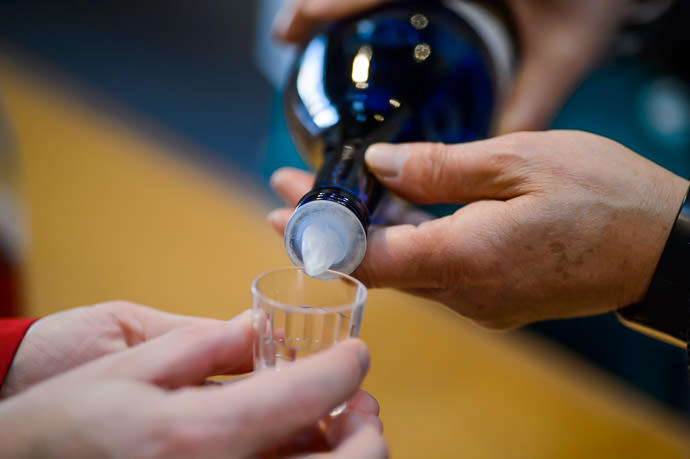
Nikon D4 + Voigtländer 125mm f/2.5 — 1/640 sec, f/2.5, ISO 6400 — map & image data — nearby photos
Pour
( staged for documentation purposes because I was too slow for the real pour )
This calls to mind “A Bunch Of Blurry Pictures of Folks Pouring Wine” and to a lesser extent “A Visit to Suntory’s Kyoto Beer Brewery”.
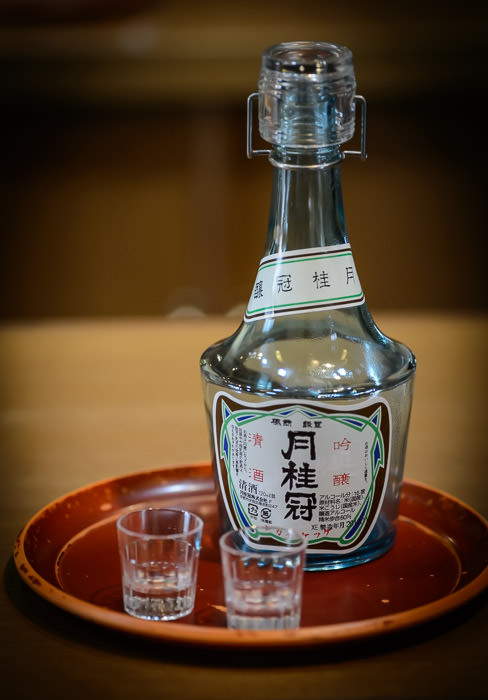
Nikon D4 + Voigtländer 125mm f/2.5 — 1/400 sec, f/2.5, ISO 6400 — map & image data — nearby photos
“Retro Bottle”
100-year-old bottle design that includes its own detachable drinking cup
Sadly, the subject nor the setting weren't nearly as photogenic as at “Japan’s First Whisky: Suntory’s “Yamazaki” Distillery”.
Just like there's a huge diversity of beer taste (e.g. Guinness Stout compared to Budweiser) and wine (thick sweet red dessert wine compared to a dry white wine), sake tastes cover a very wide gamut, and expanding the range farther is that the taste of many sake changes completely depending on the temperature it's served. So, “research” along these lines could take considerable time, and normally I would not hesitate to do this for my blog readers, but alas, we had to move on.
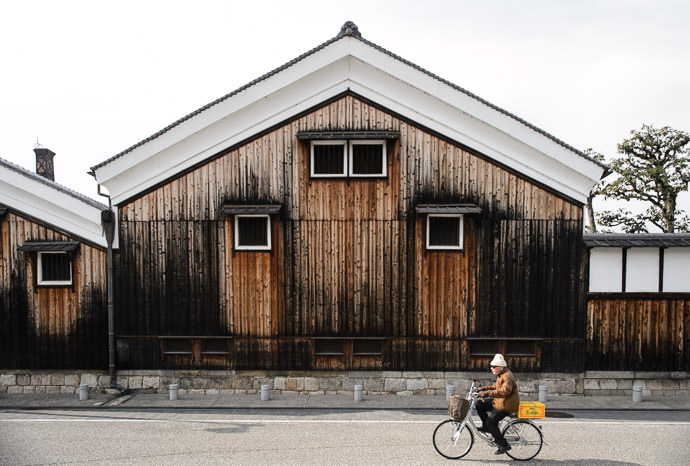
Nikon D4 + Nikkor 24mm f/1.4 — 1/640 sec, f/4, ISO 500 — map & image data — nearby photos
Old Factory Building

Nikon D4 + Nikkor 24mm f/1.4 — 1/2000 sec, f/1.6, ISO 100 — map & image data — nearby photos
“School-Commute Road”
(a natural translation to US English would be “School Zone”)
Wow, it's so convenient that kids can drop in for a quick drink on the way to school! 🙂
The next place we visited had some bicycles parked out front...
... and upon entering it became clear why.... for some reason you're not allowed to ride your bicycle in!
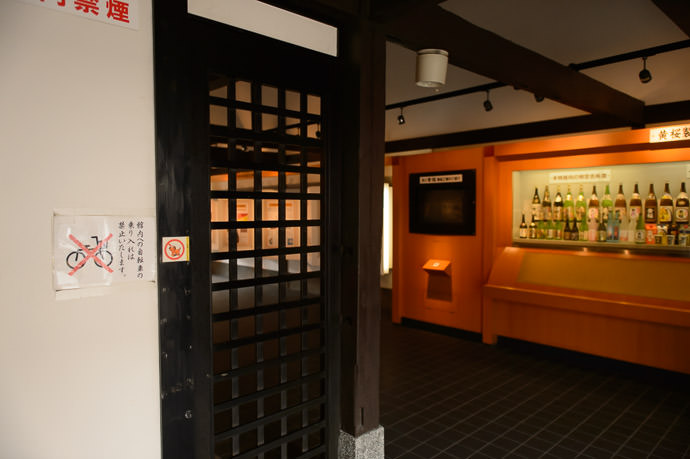
Nikon D4 + Nikkor 24mm f/1.4 — 1/640 sec, f/2.2, ISO 3600 — map & image data — nearby photos
No Bicycles Allowed
in the Kappa Gallery
(also no dogs and no smoking, the latter of which I saw being completely ignored)
Yet another silly sign that makes me wonder what bedlam would befall the place without it.
Actually, to be precise, the sign specifically says that one may not ride a bicycle in, which seems (to me) a bit unnatural unless they explicitly wanted to differentiate riding from not riding. It seems to imply that it's okay so long as you push it. I couldn't test the theory, though, because I didn't have a bicycle on me at the time.
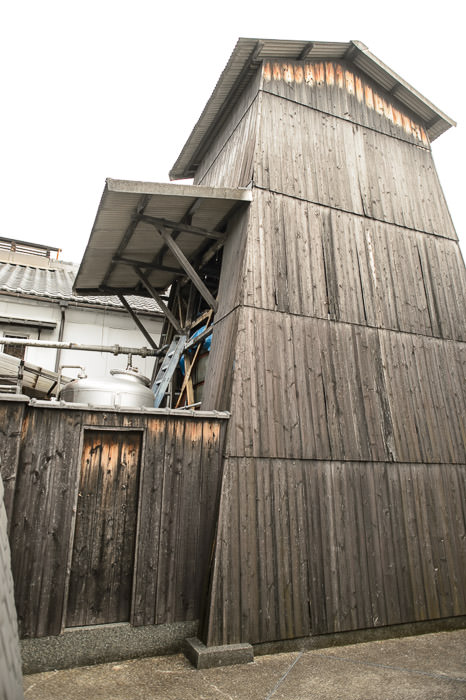
Nikon D4 + Nikkor 24mm f/1.4 — 1/640 sec, f/2.2, ISO 560 — map & image data — nearby photos
Actual Brewing
the heady smell was heavenly
This place had some actual brewing going on, and it smelled wonderful. Otherwise, there wasn't much to recommend a visit.
Two more signs from the walk home...
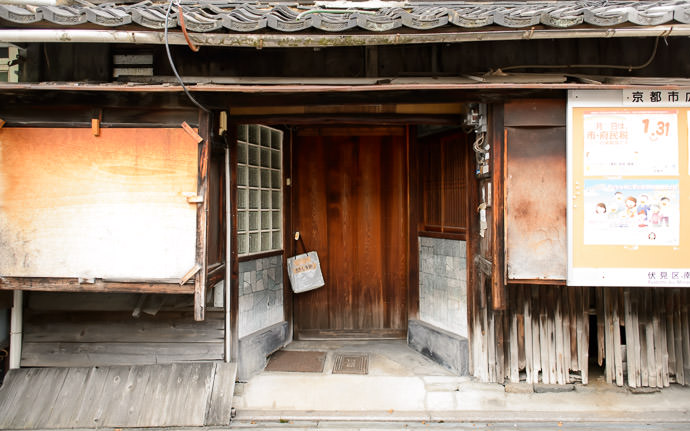
Nikon D4 + Nikkor 24mm f/1.4 — 1/640 sec, f/2.2, ISO 2200 — map & image data — nearby photos
“For Advertising Leaflets”
sign on a bag hanging on the door of an old house
Certain local businesses in Japan advertise incessantly via leaflets shoved in mailboxes (we get several per day), and I can imagine that this homeowner got sick of people ignoring a “no leaflets” sign and littering their doorstep, so perhaps this is a compromise that reduces flying trash.
And finally in a covered mall, notice the biggest sign hanging above the teeming crowd...
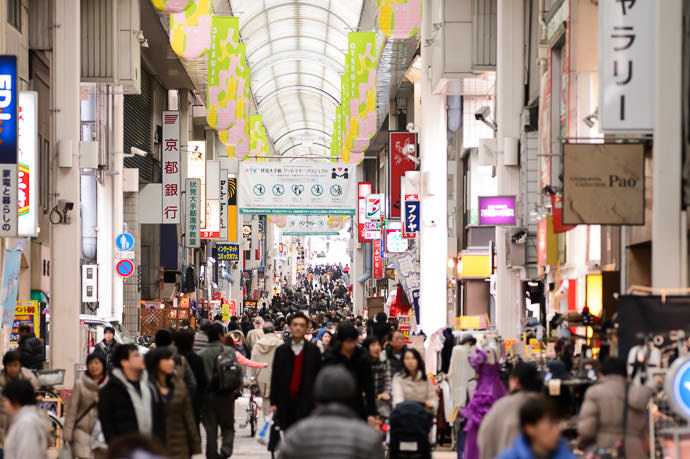
Nikon D4 + Voigtländer 125mm f/2.5 cropped — 1/640 sec, f/2.5, ISO 2500 — map & image data — nearby photos
Waste of Time
If you need to be “reminded”, reminding won't help. The “heart” with the happy smoker reminds us to follow smoking regulations. The non-heart items remind us to not litter, to not walk through the crowd with a lit cigarette, to not ride a bicycle through the crowd, and to not leave your bicycle parked in the way.
And indeed it seems that reminding does not help because none of these seem to be followed.


US of A… I have been to this Sakegura before and they were much more pleasant than this last visit. I hope it’s not because we were nikkei or they thought we were ethnic Chinese.
I had asked for a sample of their premium ‘Horin’. Well, they said no sample of this was available…but they were willing to sell us a bottle?!??
….and we would know if we liked it or not, because ?!???
I believe this family no longer understands the word ‘omotenashi’. It’s a sad situation that the country needs to be economically revived and small businesses make large steps backwards. Kana shi jokyo